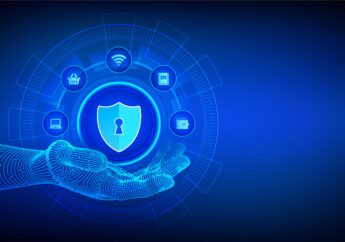5 Types of Cyberattacks and How to Protect Your Business Data
by Abdul Aziz Mondal Business Security Systems Published on: 03 December 2021 Last Updated on: 13 January 2025

What is a Cyberattack?
Cyberattacks are defined as a purposeful attempt to breach another’s information. This can be done by an individual or a group and can be done by an individual or group.
A Clark School study found that one in three Americans is the victim of a cyberattack every year. Nearly half of all cyberattacks are targeted towards small businesses, and more than half of all small businesses have been a victim of an attack. There are different types of cyberattacks, and as a business owner, it’s important for you to understand them and know how to protect yourself and your business from them.
Types of Cyber Threats to be Aware of

There are many different types of cyber threats to be aware of, and here are five of the most common attacks.
#1: Compromised Passwords
Cybercriminals can be extremely crafty, and creating fake websites that resemble actual ones is one of the ways they can gain access to your password. Business owners and non-business owners alike are more at risk for a cyberattack if they use the same password on multiple platforms. When it comes to business owners specifically, never use the same passwords on both your business and personal accounts.
#2: Data Breaches
The Identity Theft Resource Center has reported that data breaches have increased by 38% in the United States this year. A data breach is when sensitive information (e.g., social security numbers, credit card numbers, user names, and passwords) is stolen from a system. If your company has a weakness in its online security system, cybercriminals can recognize this and implement a network attack.
#3: Malware
Malware is known as malicious software, and it can significantly slow down the functionality of electronic devices or cause them to stop working completely. The most popular way that malware is installed on a device is through a link or download containing a virus. When malware has been downloaded onto a device, cybercriminals are then able to access everything from files to personal information.
#4: Phishing
Phishing occurs when emails are sent disguised as promotions, compromised password warnings, and anything that can get the receiver to click on the link or download the attachment. Similar to malware, this action then allows cybercriminals to steal sensitive information. Phishing can also occur in the form of SMS messages (smishing) and fraudulent phone calls (vishing).
#5: Ransomware
Ransomware is a form of malware that causes users the inability to access their files, with cyber criminals demanding a ransom fee in order for the users to re-access their files. Unfortunately, many users never gain access to their files even after they’ve paid the ransom fee.
How to Protect Your Business and Data
Hire a Cybersecurity Company
One of the best ways to protect your business from cyber threats is by hiring help from a cybersecurity company or expert. Professionals like GuidePoint Security provide around-the-clock monitoring for attacks, and they are also up to date on the latest innovations in cyber attacks. Cybercriminals are constantly coming up with new and creative ways to steal sensitive information, so it’s important to know how cyberattacks are evolving.
Look into VPN Services
VPN stands for Virtual Private Network, and it enables users to send and receive information across a public network in a private and secure manner. Many businesses use a VPN in addition to having a cybersecurity expert because VPNs hide your online activity from hackers. VPNs are also useful outside of business for things such as streaming apps and other online activities that hackers can gain access to.
Now that you understand a little more about cyber attacks, you can take the necessary steps to protect both your business and your personal accounts. Look into getting a VPN and hiring a cybersecurity company while also being vigilant about suspicious emails and using different, strong, hard-to-guess passwords across all of your different accounts, both business and personal.
Read Also:




































































































